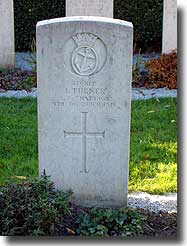|
Letters
How did a merchant stoker become a WW1 casualty in Matunga after the war had ended and end up in land locked, neutral Switzerland? (Read more about Stoker Turner) Hi, Last Sunday, I visited the Commonwealth War Grave cemetery in Vevey Switzerland. The attached picture shows a headstone which captured my interest.
Headstone of J Turner How did a merchant stoker become a WW1 casualty after the war had ended and end up in land locked, neutral Switzerland? Thanks to info on your website, it would seem that the unfortunate J Turner was captured in July 1917 by Wolf and ended up in North Germany around February 1918. After that the trail goes cold, although in 1916, agreements were made between the Swiss Government and the French, British and German Governments under which a certain number of wounded prisoners of war were interned in Switzerland. Perhaps that is what happened to Stoker Turner. I hope this info about a crew member is of benefit to others and would welcome any info that others might be able to contribute. Best regards,
My thanks for your interesting message, it is amazing how little pieces of new information come to light about something on AHOY, and now its your one about a Merchant Stoker from Matunga. To finish up in a War Grave in Switzerland is a long way from home, all due to the predatory Wolf back in 1917. How J Turner finished up where you found him is indeed a mystery, that would be wonderful to unravel. Thank you again for your time and trouble. Best regards,
Regards,
Thank you for all your input. Shared info sure is the quickest way to quickly get to the core of a subject. First, my interest - I live in the UK and work in Switzerland; it seemed appropriate on Remembrance Day to visit the local Commonwealth War Grave Cemetery in Vevey on the banks of Lake Geneva in Switzerland. I have no connection with Turner or Matunga (until now). Just curious as to how a WW1 Stoker ended up in Switzerland. Hence my search on the Internet and the fascinating story of Matunga and Wolf. Second re Turner, the Stoker. Clearly, the headstone states "stoker", but the Commonwealth War Grave website lists Turner as "Skipper". http://www.cwgc.org/cwgcinternet/casualty_details.aspx?casualty=473511 I am not in anyway nautical but "Skipper" seems to support "Captain"; more research required on this one I think. Third, thank you all for bringing me "into the loop". I'm learning a lot. As I said, I started this as a complete "outsider"; there was obviously an unusual story behind this headstone and a poignancy about being "far from home". Best regards,
I may have at last solved the mystery about J Turner, a POW from Matunga, whose headstone you recently found and photographed in Switzerland. The Australian War Memorial publishes a prestigious quarterly magazine called Wartime, their latest isue No 29, carries an article named Voyage of Despair, and is a description of the capture of Matunga by the German WW1 Armed Merchant Raider Wolf, the trials of her crew aboard the Raider. It carries this paragraph: "Some of the sickest prisoners were transferred to Switzerland for internment, where another man from Matunga, Skipper J. Turner, died on 9 December 1918." It had mistakenly been believed that he was the Captain of Matunga by dint of the use of Skipper, whereas, it looks as if that was a christian name of Turner. I had always thought before that Turner was a stoker, and the Captain was Donaldson. The War Graves listing of Skipper caused confusion, but to reiterate, it seems that Skipper was a given name, and Turner was indeed a stoker in Matunga. At last it looks as if we have learned how Skipper J. Turner, Stoker, wound up in Switzerland. Best regards, |

